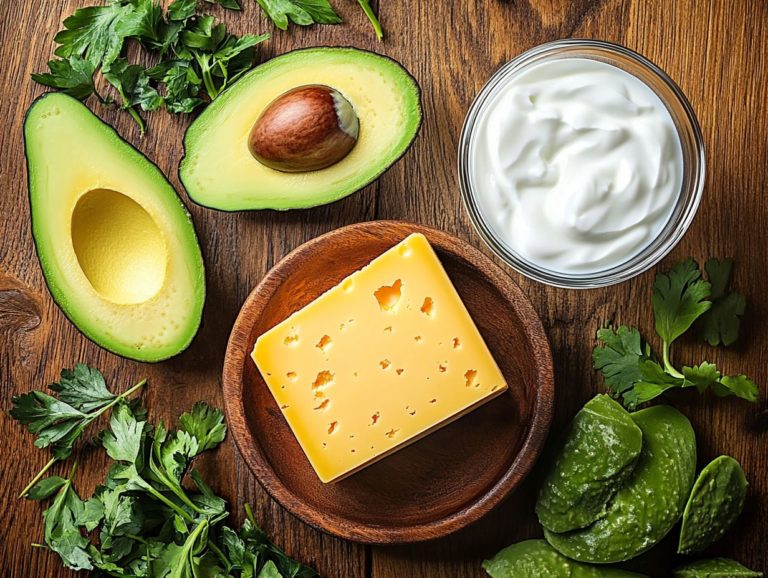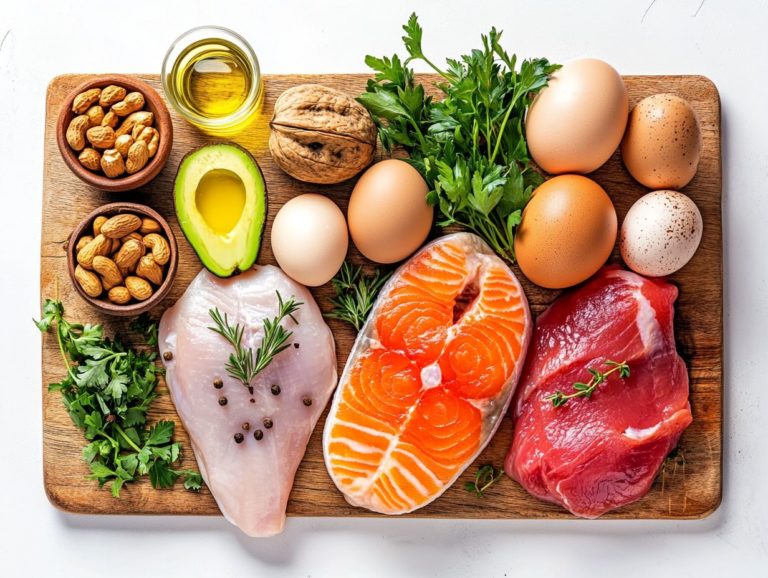Keto-Friendly Dairy Alternatives: Top Options
Are you contemplating the adoption of a keto diet yet feeling uncertain about how to approach your dairy choices? Rest assured, you re in good company! Many individuals are on the lookout for delicious, low-carb alternatives to traditional dairy while maintaining their commitment to a ketogenic lifestyle. Exciting options await you with many plant-based choices, where you can explore new flavors and textures!
This article delves into the fundamentals of a keto diet, emphasizes the significance of dairy alternatives, and showcases the finest keto-friendly options at your disposal. Whether you re a seasoned keto aficionado or just embarking on your journey, you will uncover insightful tips for selecting the right dairy alternatives, including plant-based options like almond milk and coconut milk, that align perfectly with your health objectives.
Contents
- Key Takeaways:
- What Is a Keto Diet?
- Why Are Dairy Alternatives Important for a Keto Diet?
- What Are the Best Keto-Friendly Dairy Alternatives?
- 3. Cashew Milk
- 4. Hemp Milk
- 5. Flax Milk
- 6. Oat Milk
- 7. Soy Milk
- 8. Pea Milk
- How to Choose the Right Dairy Alternative for a Keto Diet?
- Are There Any Risks Associated with Keto-Friendly Dairy Alternatives?
Key Takeaways:
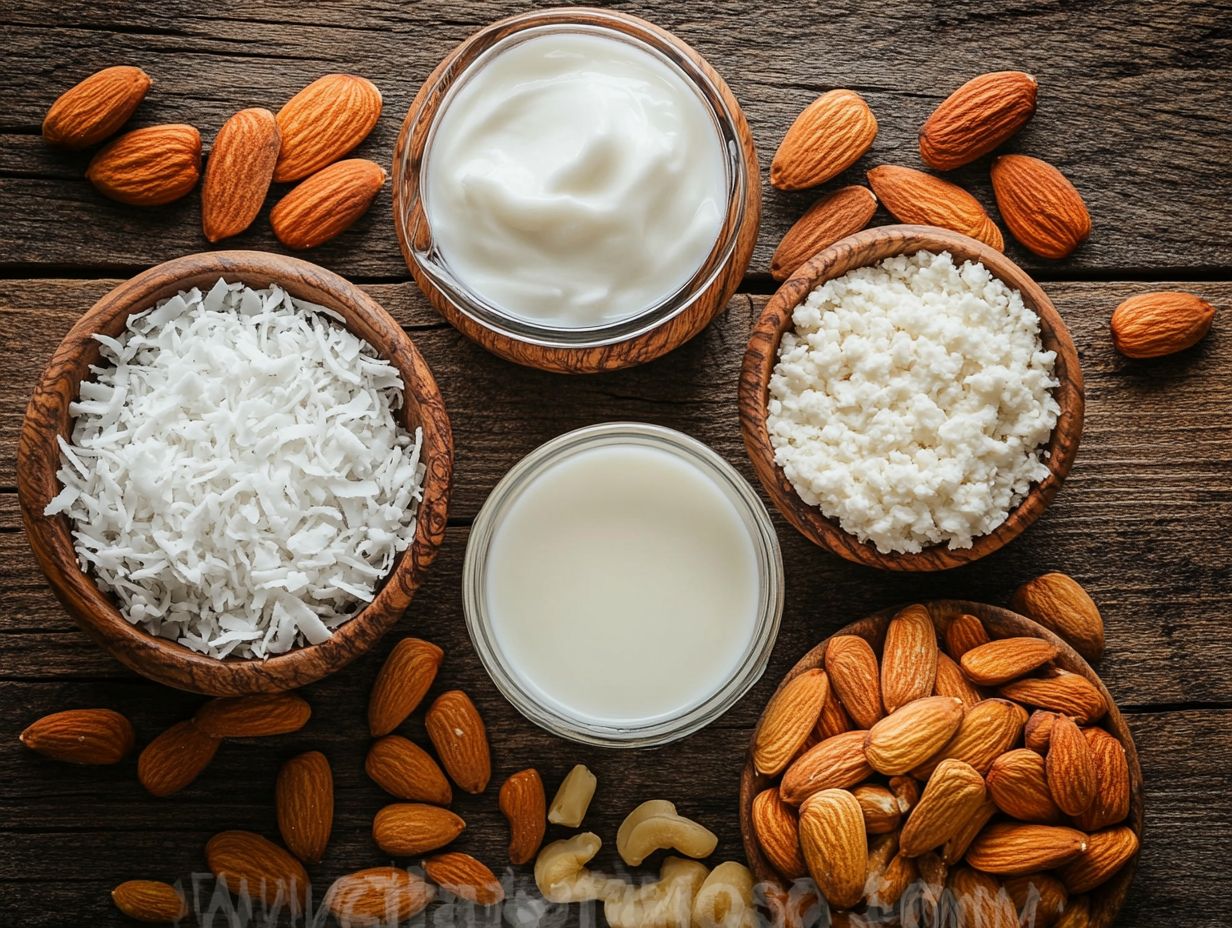
- Almond, coconut, and cashew milk are top keto-friendly dairy alternatives due to their low carb and high fat content.
- Plant-based milk options also include macadamia nut milk and flaxseed milk, which offer various nutritional benefits.
- When choosing a dairy alternative for a keto diet, it is important to check the carb content, look for unsweetened options, and consider the fat content. Opting for products like Milkadamia or Silk can help you stay on track.
- While keto-friendly dairy alternatives can be a great option for those on a keto diet, it’s important to read ingredients and be aware of any potential risks.
What Is a Keto Diet?
The keto diet, often referred to as the ketogenic diet, is a low-carb, high-fat eating approach that has captured significant attention for its impressive health benefits, such as weight loss and enhanced mental clarity.
By significantly cutting back on carbohydrates and substituting them with fats, your body enters a metabolic state known as ketosis. In this state, your body burns fat for energy instead of carbohydrates. This diet emphasizes high-quality fats, moderate protein, and minimal carbs. It effectively transforms the way your body processes nutrients and energy. Many keto recipes incorporate ingredients like heavy cream and nut-based milks to meet these nutritional goals.
With an abundance of recipes and ingredients at your disposal, the keto diet provides a wealth of delicious options for those striving for a healthier lifestyle.
Why Are Dairy Alternatives Important for a Keto Diet?
Dairy alternatives hold significant importance in the keto diet, especially for those aiming to lower carbohydrate intake or steer clear of lactose. Traditional dairy products often come with a hefty dose of carbohydrates and sugar. Low-carb alternatives are a wise choice for enjoying creamy textures and flavors without derailing your dietary objectives. Choosing unsweetened options like almond milk, coconut milk, and heavy cream can help you stay within your carb limits.
Plant-based options like almond milk, coconut milk, and heavy cream offer essential fats and nutrients that align perfectly with a ketogenic lifestyle, accommodating individuals with dairy sensitivities or preferences. By incorporating these alternatives, you not only enhance your recipes but also add variety to your diet.
What Are the Best Keto-Friendly Dairy Alternatives?
Discovering the finest keto-friendly dairy alternatives is crucial for anyone aiming to uphold a low-carb lifestyle while still savoring creamy and delightful beverages. You can seamlessly replace traditional dairy products with options like almond milk, coconut milk, and heavy cream, all without sacrificing taste. Brands like Blue Diamond and Milkadamia offer excellent choices that cater to keto needs.
These alternatives deliver healthy fats for energy and keep your carbohydrate counts low. They are ideal for your ketogenic recipes. Plus, consider incorporating nut milks such as macadamia nut milk and flaxseed milk; they not only provide exceptional flavors but also bring nutritional benefits to the table, ensuring your dietary needs are met while you enjoy a diverse range of options.
Try these exciting dairy alternatives today, and explore more resources to enhance your keto journey!
1. Almond Milk
Almond milk has become a sought-after dairy alternative for anyone on a Keto diet. Its naturally low levels of carbohydrates and calories provide a flexible foundation for various recipes.
With its delightful nutty flavor and creamy texture, you can incorporate it into smoothies, coffee, and even baked goods. This makes it a fantastic choice for Keto-friendly beverages and dishes. Be sure to choose unsweetened almond milk to avoid unnecessary sugars.
Opting for unsweetened almond milk is wise. It contains minimal added sugars, enabling you to stay on track with your nutritional goals without sacrificing taste. This makes it a preferred choice for keto dieters seeking low-carb options.
This charming beverage fits seamlessly into a low-carb lifestyle and brings a bounty of nutrients to the table. Almond milk is fortified with vitamin E, an important nutrient that helps protect your skin and boost your immune system. By adding it to your Keto recipes, you can elevate dishes such as soups and sauces while staying true to your dietary restrictions.
Popular brands like Silk and Blue Diamond offer fortified options that can enhance your nutrition. If you’re in the mood for a guilt-free dessert, almond milk can serve as a perfect ingredient for puddings or low-carb pancakes. It delivers a creamy consistency without the excess carbs typically found in traditional dairy products.
Get creative with almond milk in your baking to whip up delicious treats that you’ll love!
Its versatility makes almond milk an exceptional choice for those eager to experiment with innovative culinary creations that align with their health aspirations. Incorporating it into your kitchen routine opens up a world of possibilities, from creamy soups to delightful beverages.
2. Coconut Milk
Coconut milk stands out as an exceptional dairy alternative for those following a Keto diet. It offers a rich and creamy texture paired with a unique flavor profile.
This low-carb option is packed with healthy fats, making it an outstanding addition to a variety of recipes, including curries, soups, and smoothies. Its healthy fats align perfectly with the keto diet.
Its versatility allows you to explore both sweet and savory dishes. You can unleash your creativity in the kitchen while keeping your carbohydrate intake in check. Choosing unsweetened varieties enhances its appeal, ensuring perfect alignment with Keto dietary guidelines.
You can incorporate it into everything from curries to keto-friendly desserts. Its creamy consistency can elevate beverages like smoothies or lattes, adding a delightful twist to your traditional recipes.
When you substitute coconut milk in baking, you can create moist and flavorful treats that satisfy your sweet cravings without derailing your dietary goals. Whether you’re preparing beverages, cooking, or baking, coconut milk offers a range of delicious options.
Rich in essential vitamins and minerals like magnesium and potassium, it provides additional nutritional benefits that support your overall health. These nutrients are crucial for those on a keto diet to maintain balanced nutrition and overall wellness.
With its naturally low-carb nature, coconut milk fits seamlessly into various ketogenic recipes. It helps you curate meals that are both delicious and diet-friendly. Whether you re using it as a base for creamy soups or incorporating it into a refreshing beverage, the culinary possibilities are truly endless.
3. Cashew Milk
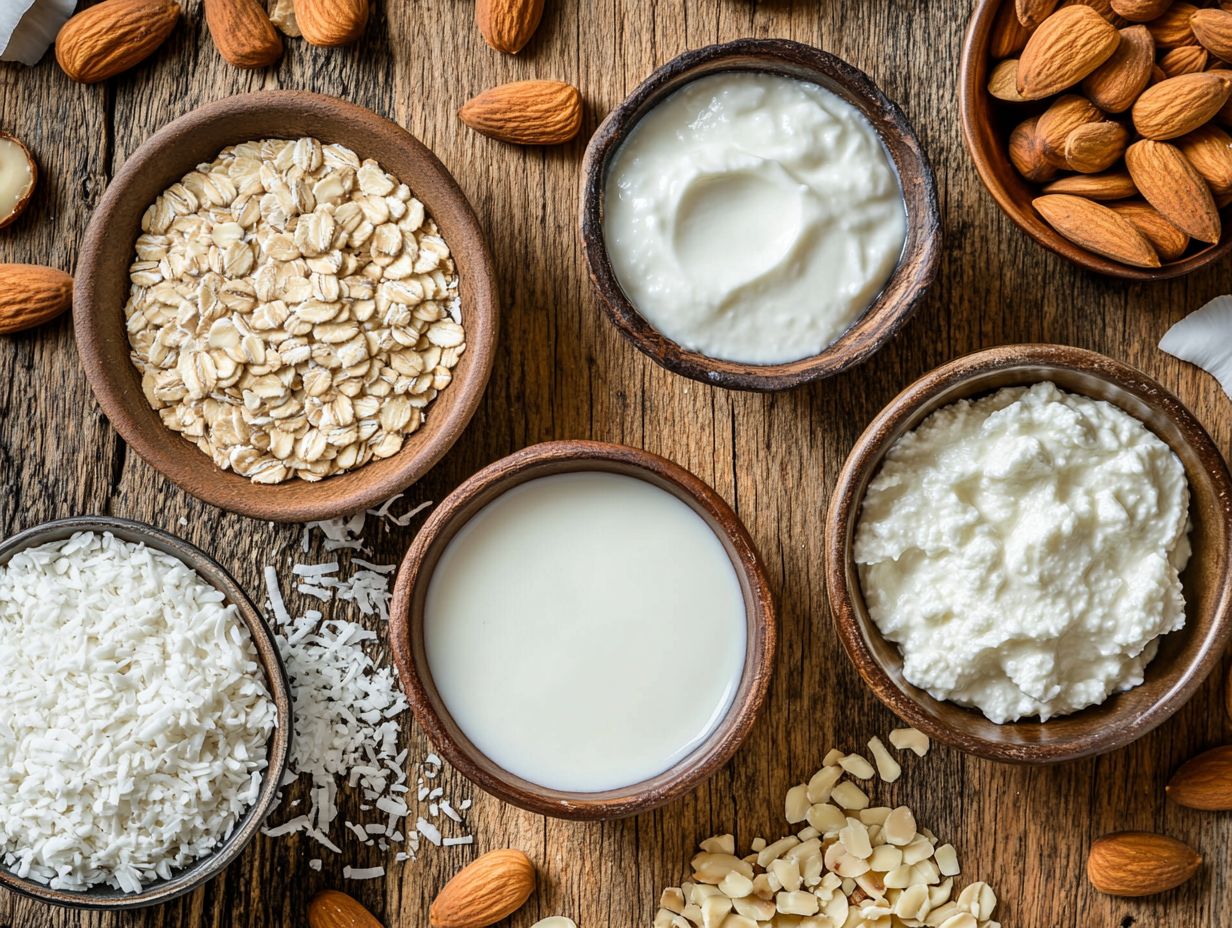
Cashew milk is a creamy dairy alternative that is perfect for your Keto diet. Its subtly sweet flavor enhances a variety of dishes and beverages, making it a delightful addition to your meal plans. Brands like Silk and Milkadamia offer great options for those following a low-carb lifestyle.
As a low-carb option, cashew milk meets your nutritional needs by providing healthy fats without the excess sugars found in traditional dairy products. You can blend it into coffee, smoothies, or use it as a base for sauces. Cashew milk adds delicious richness to your recipes, aligning beautifully with your low-carb lifestyle. Its low carbohydrate content makes it ideal for keto recipes.
This nut-based milk elevates the flavor of Keto-friendly recipes and serves as an excellent substitute for those avoiding dairy. Its velvety texture is perfect for creamy soups, casseroles, and even desserts, allowing you to enjoy delightful culinary experiences. Its versatility makes it a favorite in many keto kitchens.
With naturally sweet undertones, cashew milk pairs wonderfully with the spices and flavors commonly used in Keto cooking. This ensures your meals remain both satisfying and enjoyable. Incorporating this versatile milk into your daily routine allows you to enjoy the benefits of a nourishing diet without sacrificing flavor. It has become a beloved choice in many homes committed to low-carb principles. Plus, it serves as a great base for keto-friendly beverages and desserts.
4. Hemp Milk
Hemp milk is an exciting dairy alternative that stands out as keto-friendly and is full of plant-based protein and essential fatty acids. This low-carb option aligns with your ketogenic diet, providing a robust source of nutrition while keeping pesky carbohydrates at bay. It’s a fantastic choice for those looking to diversify their plant-based milk options.
If you’re eager to expand your beverage repertoire, hemp milk is an excellent choice for smoothies, cereal, and coffee, making it a versatile kitchen companion.
Its creamy texture and nutty flavor serve as a fantastic base for creamy soups and sauces, enhancing your dishes without adding unnecessary carbs. Hemp milk is also loaded with vital vitamins and minerals like calcium, magnesium, and iron, all contributing significantly to your overall health and well-being. This makes it a valuable addition to any keto kitchen.
For those committed to a keto lifestyle, incorporating this innovative milk alternative helps you maintain nutritional balance while satisfying your cravings for rich, flavorful foods. Whether used in baking or as a base for delectable sauces, hemp milk could easily become a staple in your pantry as you embrace a healthier way of living. It pairs well with a variety of keto recipes, enhancing both taste and nutrition.
5. Flax Milk
Flax milk, derived from flaxseeds, is a nutrient-rich dairy alternative that s perfect for your Keto journey. Naturally low in carbohydrates, this delightful milk provides a generous dose of omega-3 fatty acids, promoting heart health and overall wellness. Its creamy texture and mild flavor make it an ideal companion for smoothies, coffee, or as a base in various recipes, all while adhering to low-carb principles. It also offers nutritional benefits that support your overall health.
The nutritional profile of flax milk enhances its appeal; it s low in calories and completely dairy-free, making it an excellent choice for anyone looking to reduce caloric intake without sacrificing flavor or essential nutrients. With its smooth blend of protein, it supports muscle repair and recovery an invaluable benefit for those engaging in physical activity. Furthermore, flaxseed milk is rich in essential nutritional components that benefit your overall health.
This versatile beverage can easily be incorporated into your Keto-friendly baked goods, adding a delicious twist while keeping the carb count in check. Whether you pour it over chia seeds for a nutritious pudding or use it in creamy dressings, flax milk becomes a valuable ally in your quest for a balanced and health-conscious diet. Consider combining it with coconut milk or almond milk for added flavor and nutritional benefits.
6. Oat Milk
Oat milk has surged in popularity lately. As a Keto follower, choose low-carb options wisely.
Many commercial varieties can pack a surprising amount of carbohydrates. However, when prepared without added sugars, oat milk can be a creamy alternative that complements your balanced Keto diet beautifully.
Consider using unsweetened versions to keep your carbohydrate consumption in check. You can use it in smoothies, coffee, or baking, bringing a delightful flavor while maintaining your carbohydrate intake.
Opt for brands like Silk or Oatly for quality plant-based milk options. To ensure it fits perfectly into your Keto lifestyle, look for versions that explicitly state they are low in carbs, ideally containing around 1-2 grams per serving.
This attention to detail can significantly impact your ability to meet your nutritional goals. As you explore recipes, think about incorporating this dairy alternative into various dishes, such as creamy soups or Keto-friendly desserts.
Adding erythritol or monk fruit as natural sweeteners can enhance your recipes without adding extra carbs. By using oat milk mindfully, you can enjoy delightful culinary experiences while adhering to a low-carb regimen, achieving that perfect balance between indulgence and health.
7. Soy Milk
Soy milk is a popular dairy alternative that can seamlessly fit into your Keto diet, as long as you choose wisely to keep those carbohydrates low. It s a great source of protein, helping to sustain your energy levels.
This dairy alternative provides a creamy texture perfect for various recipes from smoothies to sauces. By opting for unsweetened varieties, you ensure you re reaping all the benefits without any added sugars that could throw your ketogenic goals off track.
Brands like Silk offer unsweetened soy milk that meets these criteria. Incorporating soy milk into your diet not only helps you meet your daily protein needs but also delivers essential nutrients like calcium and vitamin D.
These nutrients are vital during a low-carb lifestyle. You can easily integrate it into your Keto-friendly dishes, enhancing the flavors of baked goods or using it as a base for rich, creamy soups.
Try mixing it with heavy cream for added richness in your recipes. This versatile ingredient satisfies your cravings and aligns beautifully with your calorie-conscious meal planning, making it a go-to choice for those adhering to strict dietary regimens.
If you’re focused on maintaining a high-fat intake, consider combining soy milk with healthy fats like avocado or coconut oil. This combination allows you to whip up indulgent yet Keto-compliant meals that are both delicious and satisfying.
8. Pea Milk
Pea milk, crafted from yellow split peas, serves as an exceptional dairy alternative for those following the Keto diet. It delivers a creamy texture and a respectable amount of protein while keeping carbohydrates in check.
This plant-based option is incredibly versatile, easily sliding into your smoothies, coffee, or even baked goods. For a richer flavor, consider combining it with macadamia nut milk.
With its health benefits and low-carb profile, pea milk is swiftly gaining traction among individuals seeking dairy substitutes in their diets. This alternative presents a rich and satisfying flavor and boasts a protein content that rivals traditional dairy options.
It s the perfect choice for anyone looking to boost their protein intake without derailing their Keto lifestyle. Whether you’re whipping up a decadent Keto pancake batter or crafting a mouthwatering sauce, pea milk seamlessly enhances both texture and nutritional value.
Packed with essential nutrients and vitamins, pea milk supports your overall health, resonating with those who prioritize wholesome ingredients in their meals. Consequently, it s becoming increasingly popular across various culinary applications, highlighting its remarkable adaptability in contemporary cooking.
9. Rice Milk

Rice milk can present quite the conundrum for Keto dieters, as it typically boasts a higher carbohydrate content than other dairy alternatives. However, when consumed in moderation and carefully chosen to avoid added sugars, it can find a place in certain recipes, especially smoothies and desserts. Understanding its carbohydrate content is crucial for seamlessly integrating rice milk into your low-carb lifestyle while still relishing its distinct flavor. Consider using it alongside lower-carb options like milkadamia to balance the overall carb intake.
Rice milk offers a creamy texture that can elevate your coffee or baked goods. It s important to keep in mind that a standard serving can contain up to 20 grams of carbohydrates numbers that can swiftly eat into your daily intake limits.
If you’re seeking a versatile option in the kitchen, rice milk can beautifully complement dishes like oatmeal or soup, making it an appealing alternative for enhancing overall taste. Balancing its use with lower-carb options like almond or coconut milk could be a savvy approach, allowing you to enjoy the delightful qualities of rice milk while staying true to your dietary goals. For added creaminess, you might also try incorporating cashew milk into your dishes!
How to Choose the Right Dairy Alternative for a Keto Diet?
Selecting the ideal dairy alternative for your Keto diet demands thoughtful consideration of various factors to ensure it aligns seamlessly with your low-carb nutritional objectives. With many options at your disposal, it s crucial to check the carbohydrate content, fat levels, and any additional ingredients to identify what best suits your dietary requirements.
Products from brands like Milkadamia, Blue Diamond, and Magic Spoon can offer you high-quality alternatives that meet your needs. By grasping how each alternative impacts your overall intake, you ll be enabled to craft delectable Keto recipes while sustaining a balanced lifestyle. When you make well-informed choices, you can enjoy a variety of dairy alternatives without straying from your dedication to the Keto diet!
1. Evaluate Carbohydrate Content
When choosing a dairy alternative for your Keto diet, one of the most crucial factors to consider is the carbohydrate content. Excessive carbs can derail your body’s ability to maintain ketosis, so it s essential to check nutrition labels. Look for options that offer the lowest carbohydrate levels while still delivering on flavor and texture.
Opting for unsweetened varieties of dairy alternatives can significantly curb your carb intake and align perfectly with your low-carb lifestyle. This attention to detail is especially vital if you’re adhering to strict dietary restrictions, as even the tiniest amounts of hidden sugars can accumulate rapidly.
For example, almond milk and coconut milk emerge as stellar low-carb choices, typically containing only 1-2 grams of carbs per serving perfect for your smoothies or morning coffee. Unsweetened soy milk is another fantastic option if you re in search of a creamy alternative with minimal carb impact. Brands like Healthline and USDA provide reliable nutritional information to guide your choices.
By selecting these low-carb dairy substitutes, you can confidently remain in a state of ketosis while indulging in a diverse array of flavors, all while enjoying a satisfying and enjoyable diet. Try experimenting with vegan options like macadamia nut milk for a tasty twist and keep things interesting!
2. Look for Unsweetened Options
When selecting dairy alternatives for your Keto diet, seek out unsweetened options.
Added sugars can increase carbohydrate counts, so choosing unsweetened varieties aligns with a low-carb lifestyle. This allows you to enjoy your beverages and recipes without compromising your dietary goals.
Try adding alternative sweeteners like erythritol or monk fruit to elevate the flavor profile without piling on extra carbs. These sweeteners can be a delightful addition to your beverages or Keto-friendly desserts.
By prioritizing unsweetened products, you can easily avoid hidden sugars often found in flavored dairy substitutes. This thoughtful choice helps maintain stable blood sugar levels and enhances your sense of fullness.
Embracing the potential of natural sweeteners opens the door to culinary adventures without guilt. Making informed choices ultimately supports your health objectives, allowing for a more enjoyable and sustainable Keto journey without sacrificing taste or texture.
Don’t forget to check your grocery store for the best options available.
3. Consider the Fat Content
When navigating the world of dairy alternatives on a Keto diet, paying attention to fat content is essential.
Healthy fats serve as a primary energy source in this low-carb lifestyle. Choosing options with higher fat levels not only supports ketosis but also enhances satiety and flavor in your meals.
Consider integrating heavy cream or coconut cream for richer textures and flavors in your Keto recipes.
Understanding how to balance fat and carbohydrate ratios in non-dairy options will help you meet your dietary needs while enjoying a variety of flavors and textures.
For example, coconut cream and full-fat almond milk are excellent choices that provide a significant fat boost, making them ideal for smoothies and creamy dishes. Similarly, opting for fortified nut-based yogurts with higher fat content can elevate the nutritional profile of your meals while keeping carbs in check.
By choosing dairy alternatives rich in healthy fats, you can enjoy delicious meals that align with your Keto aspirations while nourishing your body with essential nutrients.
4. Read the Ingredients List
Reading the ingredients list is crucial when selecting dairy alternatives for your Keto diet.
Many products contain additives and fillers that may spike carbohydrate content or compromise quality. Opting for minimally processed options with straightforward ingredients helps you make informed choices that align with your Keto goals.
Prioritizing products featuring whole-food ingredients enhances flavor and texture, supporting your overall health.
It s vital to understand the implications of each component in these alternatives. Some additives, like thickeners, artificial flavors, and sweeteners, can undermine benefits and potentially lead to health issues. Fillers like starches can significantly elevate carbohydrate counts, jeopardizing your Keto approach.
Honing your skills in spotting these potentially harmful ingredients, which often disguise themselves under vague labels, is essential.
By emphasizing transparency and simplicity in your food choices, you can uphold your nutritional integrity and embrace a Keto lifestyle that fosters vitality and long-lasting wellness.
Are There Any Risks Associated with Keto-Friendly Dairy Alternatives?
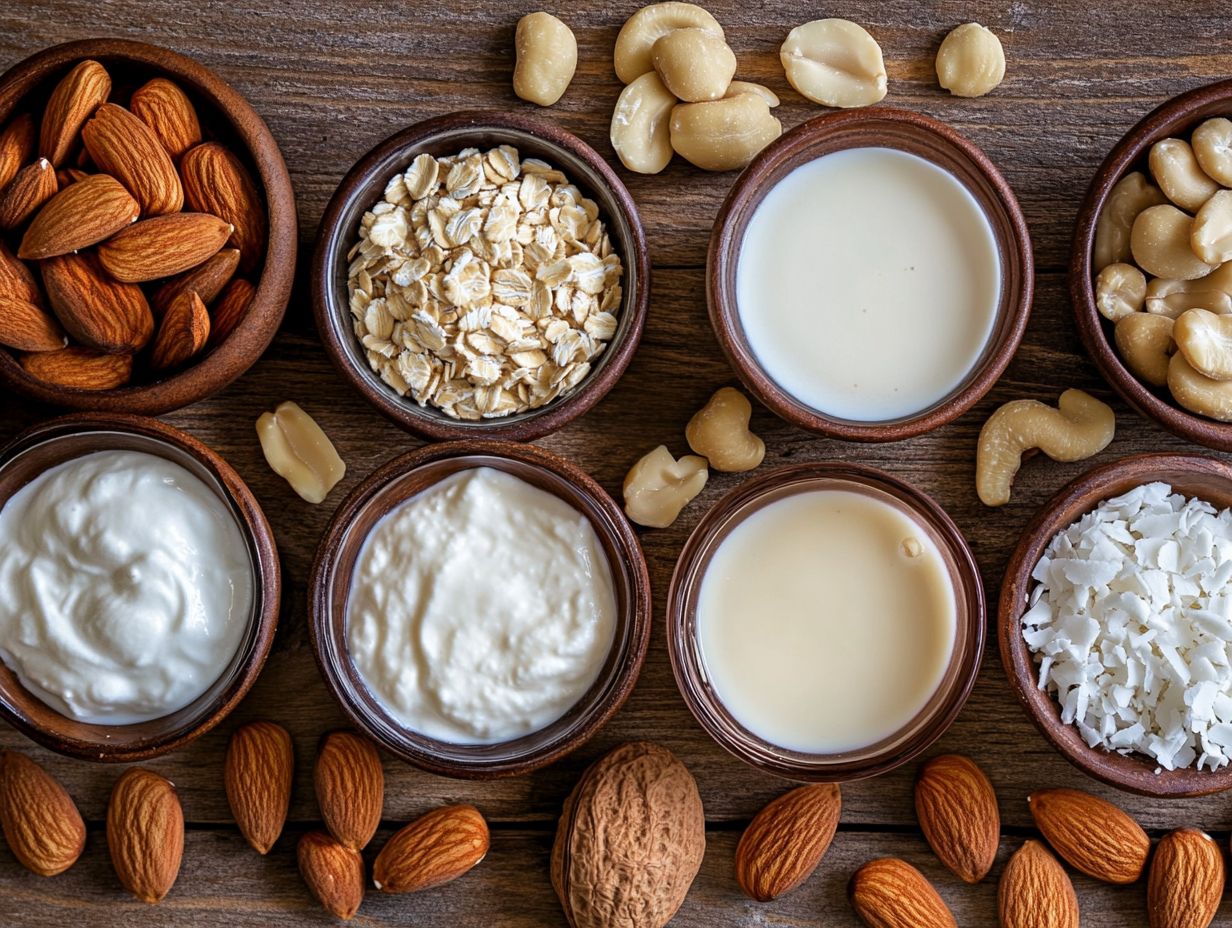
Keto-friendly dairy alternatives can be advantageous for those aiming to minimize carbohydrate intake. However, don t overlook the potential risks when enjoying these alternatives!
Some individuals may experience digestive discomfort or allergic reactions to ingredients commonly found in plant-based options, like nuts and soy. Relying too much on processed dairy alternatives can lead to nutrient imbalances if your diet lacks variety.
Therefore, it s essential to choose high-quality options and maintain a balanced approach to nutrition while navigating your Keto lifestyle.
Frequently Asked Questions
What are some keto-friendly dairy alternatives?
Some great keto-friendly dairy alternatives include almond milk, coconut milk, macadamia nut milk, cashew milk, and hemp milk. These plant-based milks are low in carbs and high in healthy fats, making them excellent options for those following a keto diet.
Is soy milk a good keto-friendly dairy alternative?
No, soy milk is not recommended for a keto diet as it tends to be high in carbs and may contain added sugars. It’s best to stick to plant-based milks that are lower in carbs and sugar.
Are there any keto-friendly yogurt options?
Yes, several keto-friendly yogurt alternatives are available, including coconut yogurt, almond milk yogurt, and cashew milk yogurt. Look for options that are unsweetened and low in carbs to stay within your keto macros.
Can I still enjoy cheese on a keto diet?
Yes, cheese can be a part of a keto diet when consumed in moderation. Some keto-friendly cheese options include cheddar, feta, goat cheese, and brie. Always check the nutrition label for carb and fat content before consuming.
What about butter and cream, are they keto-friendly dairy options?
Butter and heavy cream are indeed keto-friendly as they are high in fat and low in carbs. However, it’s important to be mindful of portion sizes since they can quickly add up in terms of calories.
Are there any non-dairy keto-friendly milk options?
Yes, several non-dairy keto-friendly milk options are available, including almond milk, coconut milk, cashew milk, and hemp milk. Always choose unsweetened varieties to keep carbs low and check the nutrition label for fat and carb content.
For more information on keto diets and dairy alternatives, explore additional resources or share your experiences with these options!




